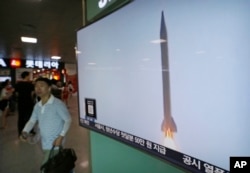It continues to be difficult to gauge the effectiveness of the United Nations sanctions imposed on North Korea in March for conducting its fourth nuclear test and launching a long range rocket earlier this year.
While prices for essential goods in the North remain stable, there are reports that business is stagnating at the economic development zones set up to attract foreign investment.
Analyst Lim Eul-chul with Kyungnam University’s Institute for Far East Studies told VOA’s Korean Service that economic activity in two development zones near the Chinese border has deceased significantly in the last five months.
“The Mubong Economic Development Zone and the Onsung Island Economic Development Zone established detailed development plans and China had planned to invest in these areas. However, since the international community imposed sanctions against North Korea, and especially after China participated in the sanctions, such movements have been stopped,” said Lim.
The lack of international investment is, to some degree, the result of the U.N. sanctions that place increased financial restrictions on companies that do business with North Korea and U.S. sanctions that authorize the seizure of assets from international organizations and individuals involved with banned North Korean industries like mining and banking.
But Adam Cathcart, an East Asia expert at Britain’s Leeds University notes that even without sanctions, international companies are reluctant to invest in North Korea's economic development zones because they do “not provide enough infrastructure.”
China slowdown
Beijing’s enforcement of international sanctions is considered crucial because 90 percent of North Korean trade flows either to or through China.
In 2015, even before sanctions were imposed, North Korean exports fell 14.8 percent in large part due to the economic slowdown in China, according to the Bank of Korea in Seoul.
North Korea does not publish economic data, but in the last few months there have been reports that sanctions are having some impact.
Observers reported a reduction in vehicle traffic at the Sino/North Korean border, the suspension of currency transfers to North Korean banks, and increased inspections of North Korean vessels entering Chinese ports.
Stable prices
However there have also been reports that food and fuel prices in North Korea have not been affected by the new sanctions imposed this year.
The Reuters news agency and the Seoul-based Daily NK website, an organization staffed by defectors, gathered data to show the price of rice, corn, pork, petrol and diesel remained relatively stable over the last year.
The price of gasoline or petrol, they said, did initially increase 45 percent due to a fear of shortages under sanctions, but soon returned to normal.
Analysts credit the growth of semi-legal private markets under leader Kim Jong Un for keeping food and fuel supplies stable despite the sanctions.
North Korea analyst Andrei Lankov with Kookmin University in Seoul recently told Radio Free Asia that he is not sure if China is purposely evading enforcement of the U.N. measures, but he said, “if sanctions implementation begins to threaten the survival of the Kim Jong Un regime, China will pull back.”
North Korea has responded defiantly to the U.N. sanctions by test firing multiple short and medium range missiles that burn tons of fuel.
China has called on North Korea to give up its nuclear ambitions. But it also wants a stable North Korea to counterbalance the U.S., South Korean military alliance on the peninsula.
Lankov said the decision by Washington and Seoul to deploy the controversial THAAD missile defense system in South Korea will likely increase Beijing’s support for Pyongyang.
Kim Jung-woo in Washington and Youmi Kim in Seoul contributed to this report.






